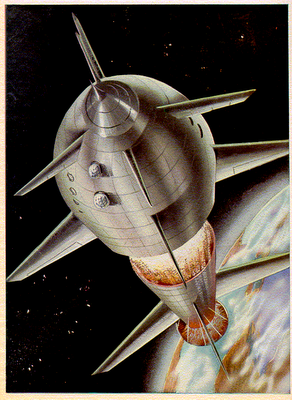
Associated Press reporta que el físico ingles Stephen Hawking ha declarado de que si la humanidad no establece bases espaciales en la luna y Marte, para usar como plataforma para explorar otros sistemas solares, arriesga gravemente a su futuro.
Hawking estima que dentro que de 40 años podíamos –si no nos terminamos matando entre nosotros-- armar una base en Marte que no dependería de la tierra.
Dijo, “Es importante que la raza humana se desparrama por el espacio si va a sobrevivir como especie. La vida sobre la tierra esta cada vez más amenazada de ser extinguida por un desastre como calentamiento global repentino, guerra nuclear, un virus manipulado genéticamente o otros peligros que aun ni siquiera se nos han ocurrido.”
Imagen: fuente
15.6.06
"Tenemos que poblar es espacio" Stephen Hawking teme por una catástrofe global
Suscribirse a:
Comentarios de la entrada (Atom)

1 comentario:
Hawking: Space key to human survival
HONG KONG, China (AP) -- The survival of the human race depends on its ability to find new homes elsewhere in the universe because there's an increasing risk that a disaster will destroy Earth, world-renowned physicist Stephen Hawking said.
Humans could have a permanent base on the moon in 20 years and a colony on Mars in the next 40 years, the British scientist told a news conference.
"We won't find anywhere as nice as Earth unless we go to another star system," added Hawking, who came to Hong Kong to a rock star's welcome Monday. Tickets for his lecture Thursday were sold out.
Hawking said that if humans can avoid killing themselves in the next 100 years, they should have space settlements that can continue without support from Earth.
"It is important for the human race to spread out into space for the survival of the species," Hawking said. "Life on Earth is at the ever-increasing risk of being wiped out by a disaster, such as sudden global warming, nuclear war, a genetically engineered virus or other dangers we have not yet thought of."
The 64-year-old scientist -- author of the global best-seller "A Brief History of Time" -- uses a wheelchair and communicates with the help of a computer because he suffers from a neurological disorder called amyotrophic lateral sclerosis, or ALS.
One of the best-known theoretical physicists of his generation, Hawking has done groundbreaking research on black holes and the origins of the universe, proposing that space and time have no beginning and no end.
However, Alan Guth, a physics professor at the Massachusetts Institute of Technology, said Hawking's latest observations were something of a departure from his usual research and more applicable to survival over the long-term.
"It is a new area for him to look at," Guth said. "If he's talking about the next 100 years and beyond, it does make sense to think about space as the ultimate lifeboat."
But, he added, "I don't see the likely possibility within the next 50 years of science technology making it easier to survive on Mars and on the moon than it would be to survive on earth."
"I would still think that an underground base, for example in Antarctica, would be easier to build than building on the moon," Guth said.
Joshua Winn, an astrophysicist at MIT, agreed. "The prospect of colonizing other planets is very far off, you must realize," he said.
Hawking's "work has been highly theoretical physics, not in astrophysics or global politics or anything like that," Winn added. "He is certainly stepping outside his research domain."
Hawking's comments Tuesday were reminiscent of the work of American astrophysicist Carl Sagan, who was a believer in the existence of extraterrestrial intelligence.
Sagan, a Cornell University professor and NASA-decorated scientist who died in 1996, noted that organic molecules, the kind that life on Earth is dependent on, appear to be almost everywhere in the solar system.
Sagan played a leading role in the U.S. space program, helping design robotic missions and contributing to the Mariner, Viking, Voyager and Galileo expeditions.
But his work also focused on the search for habitable worlds and intelligent life beyond the solar system, as well as theories about life's origins, ideas popularized in his best-selling 1985 novel, "Contact," which was made into a film starring Jodie Foster.
At Tuesday's news conference, Hawking said he too was venturing into the world of fiction. He plans to team up with his daughter, 35-year-old journalist and novelist Lucy Hawking, to write a children's book about the universe aimed at the same age group as the Harry Potter books.
"It is a story for children, which explains the wonders of the universe," said Lucy Hawking. They did not provide further details.
Copyright 2006 The Associated Press. All rights reserved.This material may not be published, broadcast, rewritten, or redistributed.
Find this article at:
http://edition.cnn.com/2006/TECH/space/06/14/humansurvival.hawking.ap
Publicar un comentario